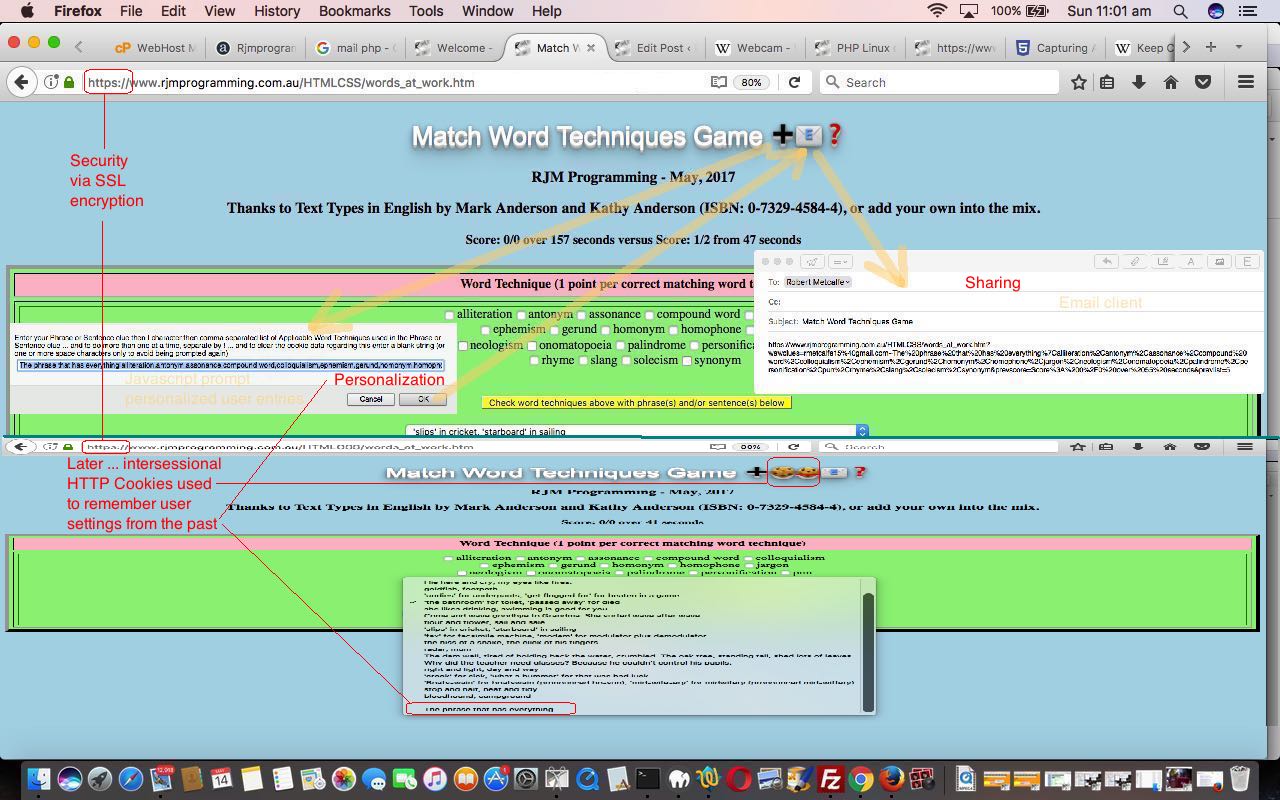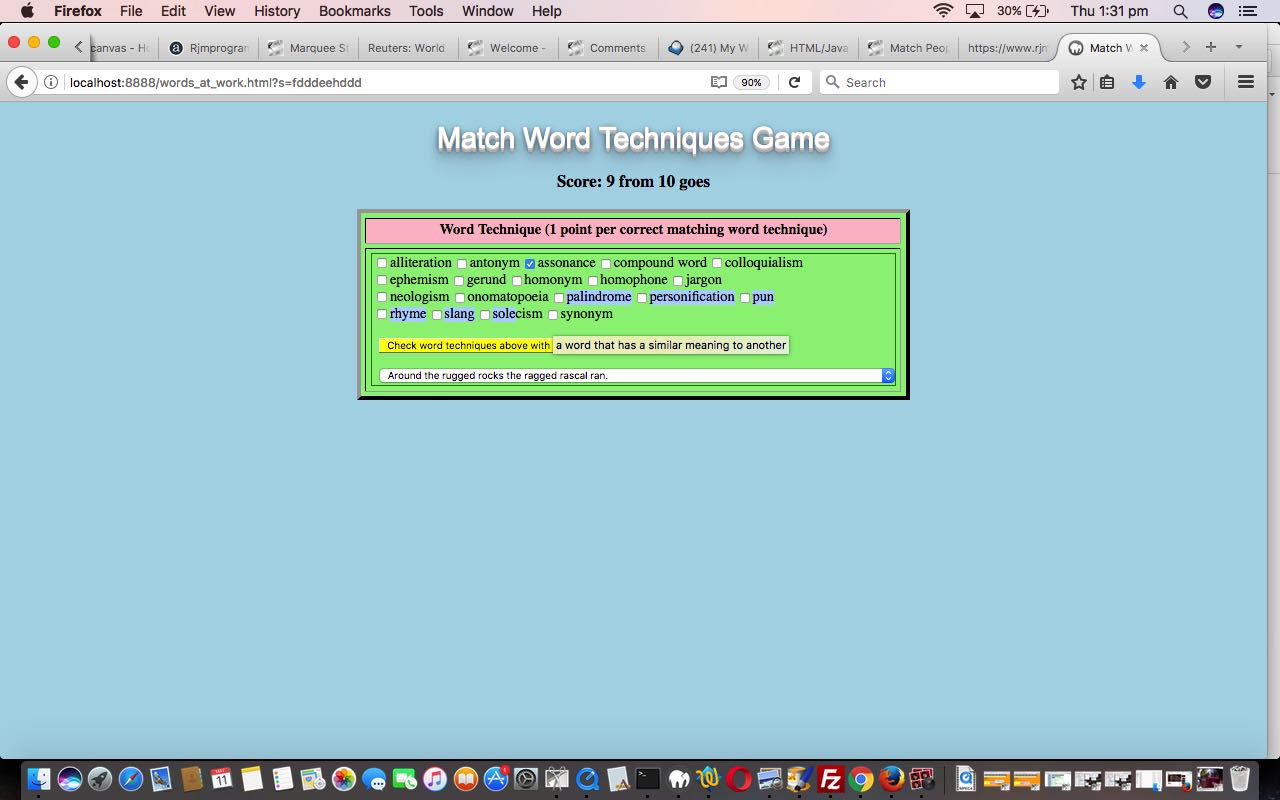There are two categories to our additional functionality we add to the web application of Word Techniques Game Primer Tutorial from yesterday, those being …
- sharing and personalization additional functionality
- interface to SSL, as a security issue, with a view to overall ESL game thoughts
Respectively we …
- involve Javascript, including (HTTP) Cookie methods, and PHP, regarding email ( 📧 ) sharing … the ‘bells and whistles’ as described in Following Orders Game PHP Tutorial
- in general terms, mapping http:// to // … a consideration in HTML and PHP code components
… to make our game have additional sharability and personalization and security qualities, especially should you be one of those users with a policy of only wanting to involve email on SSL (https:// URL) websites. By the way, if you are one of those and you don’t see any green lock symbols up at the address bar URL above, change the URL to start https:// at this blog, to encrypt everything that goes on in an SSL manner to aid with security concerns.
Our personalization above takes the form of a ➕ emoji “button” added to the webpage to facilitate the user adding their own Phrase or Sentence|Comma Separated Word Technique List entries. Those user entries are remembered both in an intrasessional way (simply by not leaving the webpage you are on) and in an intersessional way ( by saving user settings with HTTP Cookies 🍪 ).
Our sharability, above, takes the form of email. Should there be a limited size of user created personalized data, that email can be constructed using the email client desktop application (which on this MacBook Pro running Mac OS X operating system is the Mail desktop application), whereas a PHP helper called words_at_work.php can, given a user defined email address ( via ❓ emoji “button”), use the PHP mail to help out with those larger data sets, via HTML form method=POST action=words_at_work.php navigation.
Here is today’s live run link, the supervisory HTML and Javascript code for which you can download words_at_work.htm and see how it changed at this link.
Previous relevant Word Techniques Game Primer Tutorial is shown below.
We’ve based a new ESL word game we want to call “Match Word Techniques Game”, designed for very advanced English students (even native speakers, perhaps) on a previous “one to many” arrangement, where …
- the “one” is a phrase or sentence exemplifying …
- the “many” is a word technique or more than one
… like we designed with our ESL word game described in HTML/Javascript Jobs Match Game Tutorial. It’s “many” checkbox and “one” select element design still holds true today.
What do we mean by “Word Techniques”? That is where we’d like to thank our inspirational resource, the book Text Types in English by Mark Anderson and Kathy Anderson (ISBN: 0-7329-4584-4) (p. 72-74) lists the following word techniques that can occur in English phrases and/or sentences (appearing in the select element “dropdown”) …
| Word Technique | Description |
|---|---|
| alliteration | the use of the same letter or sound in two or more words that are close together. It is indicated by repeated consonants. |
| antonym | a word that has the opposite meaning to another |
| assonance | the use of the same letter or sound in words that are close together. It is indicated by repeated vowels or vowel sounds. |
| compound word | a word made up by putting two or more existing words together |
| colloquialism | a word used in everyday writing or speech, as opposed to formal or literary texts |
| ephemism | a word or phrase used to communicate an idea in a polite or less direct way |
| gerund | a verb that functions as a noun |
| homonym | a word with the same spelling as another, but with a different meaning |
| homophone | a word that sounds the same as another but has a different meaning |
| jargon | the use of words that are particular to a specific subject or occupation |
| neologism | a new word or expression in a language |
| onomatopoeia | the use of words that sound like the action they represent |
| palindrome | a word or phrase that reads the same backwards as forwards |
| personification | the use of words, usually verbs, that are associated with people to describe non-human things |
| pun | the use of one word to suggest different meanings |
| rhyme | the sound of two or more words matching |
| slang | words that are not accepted in ‘formal’ English |
| solecism | the mispronunciation of a word that relates to technical language, or jargon |
| synonym | a word that has a similar meaning to another |
As you can see with many word technique concepts above, some of the answers will need advanced English skills, which you can try with today’s live run link, the HTML and Javascript code for which you can download words_at_work.html and see how it was arrived at via this link.
If this was interesting you may be interested in this too.
If this was interesting you may be interested in this too.




